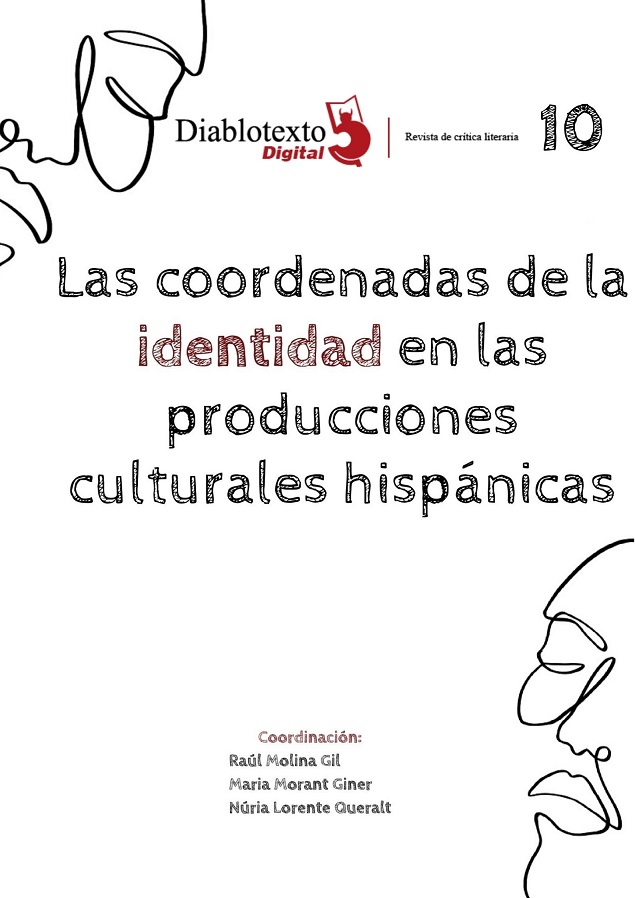Catalan identity in Las cuatro barras de sangre, by Manuel Fernández y González (1872)
DOI:
https://doi.org/10.7203/diablotexto.10.21493Keywords:
Nationalism, Catalanism, Spanishism, Renaixença, serialized novel Abstract
Abstract
This article aims to study the way in which Catalan identity is negotiated with Spanish nationalism in Las cuatro barras de sangre (1872), by Manuel Fernández y González, who in that text dealt with the very popular founding myth in Renaixença of Vifredo el Velloso. To do this, we will analyze the novel taking into account the way in which it refers to the character and his story, but starting from the context of the author. From this we can conclude that the background of the work implied a good reception of Catalanism by Spain, but the content of the text, decontextualized, could lead to the radicalization of the assumptions of the Renaissance.
 Downloads
Downloads
 References
References
Anderson, Benedict (1993). Comunidades imaginadas. Reflexiones sobre el origen y la difusión del nacionalismo. Traducción de Eduardo L. Suárez. México D. F.: Fondo de Cultura Económica.
Andreu Miralles, Xavier (2016). El descubrimiento de España: mito romántico e identidad nacional. Barcelona: Taurus.
Anguera, Pere (2001). “Entre dues possibilitats: espanyols o catalans?”. En Joaquim Albareda (ed.), Del patriotisme al catalanisme. Societat i política (segles xvi-xix). Vic: Eumo, pp. 317-337.
Anónimo (1872). El combate, 21 de julio, p. 4.
Aparici, Pilar; Gimeno, Isabel (eds.) (1996). Literatura menor del siglo xix. Una antología de la novela de folletín (2 vv.). Barcelona: Editorial Anthropos.
Balaguer, Víctor; Alba, Juan de (1848a). Las cuatro barras de sangre (segunda parte de Vifredo el Velloso), drama en cuatro actos. Barcelona: Imprenta y librería de la señora viuda e hijos de Mayol, Editores.
Balaguer, Víctor (1848b). Vifredo el Velloso, drama en tres actos precedido de un prólogo. Barcelona: Imprenta y librería de la señora viuda e hijos de Mayol, Editores.
Canal, Jordi (2018). Con permiso de Kafka. El proceso independentista en Cataluña. Barcelona: Península.
Cantos Casenave, Marieta (2018). “La buena madre, de Manuel Fernández y González. Representaciones literarias del poder femenino en tiempos convulsos”, Crítica hispánica, v. 40, n.º 2, pp. 31-52.
Caro Baroja, Julio (2004). El mito del carácter nacional. Madrid: Editorial Caro Raggio.
Fernández y González, Manuel (1850). Obispo, casado y rey. Crónicas de Aragón. Don Ramiro el Monje. Leyenda histórica. Granada: Imprenta y librería de D. J. M. Zamora.
Fernández y González, Manuel (1867). La honra y el trabajo (Historia de las clases trabajadoras). Barcelona: Víctor Pérez, Editor.
Fernández y González, Manuel (1872). Las cuatro barras de sangre. Crónica catalana. Madrid: Urbano Manini.
Fernández y González, Manuel (1875). Cid Rodrigo de Vivar (El Cid Campeador) (2 vv.). Madrid: Urbano Manini.
Ferreras, Juan Ignacio (1972). La novela por entregas 1840-1900 (Concentración obrera y economía editorial). Madrid: Taurus.
Ferreras, Juan Ignacio (1979). Catálogo de novelas y novelistas españoles del siglo xix. Madrid: Cátedra.
Hernández Girbal, Florentino (1931). Una vida pintoresca: Manuel Fernández y González. Biografía novelesca. Madrid: Biblioteca Atlántico.
Leersen, Joep (2007). “Imagology: History and method”. En Manfred Beller y Joep Leersen (eds.), Imagology. The cultural construction and literary representation of national characters. New York: Rodopi, pp. 17-32.
Maalouf, Amin [1999] (2020). Identidades asesinas. Traducción de Fernando Villaverde. Madrid: Alianza.
Rubio Cremades, Enrique (1982). “Novela histórica y folletín”, Anales de Literatura Española, n.º 1, pp. 269-281.
Penas, Ermitas (1996). “Sobre la poética de la novela histórica romántica”, Revista de literatura, n.º 58, pp. 373-385.
Pérez Vejo, Tomás (1999). Nación, identidad nacional y otros mitos nacionalistas. Oviedo: Ediciones Nobel.
Préstamo Landín, María Teresa (2018). “El destino de los héroes: el recurso de la adivinación en dos novelas históricas de Manuel Fernández y González”, Hesperia, v. XXI, n.º 2, pp. 51-68, en <http://revistas.webs.uvigo.es/index.php/AFH/article/view/1330> [Fecha de consulta: 2 de septiembre de 2021].
Downloads
Published
How to Cite
-
Abstract261
-
PDF (Español)132
Issue
Section
License
Licencia de reconocimiento de Creative Commons “Reconocimiento - No Comercia l- Sin Obra Derivada
Authors who publish with this journal agree to the following items:
The authors will keep their copyright and guarantee the journal the right of first publication of their work, which will be simultaneously subject to the Creative Commons license that allows third parties to share the work indicating its author and its first publication in the journal. The authors may adopt other non-exclusive license agreements to distribute the version of the published work (e.g., depositing it in an institutional telematic file or publishing it in a monographic volume), with an acknowledgment of its initial publication in this journal. The authors are allowed and encouraged to disseminate their work through the Internet (e.g., in institutional telematic archives or on their website) before and during the submission process, which can produce interesting exchanges and increase citations of the published work. (See Effect of Open Access)




